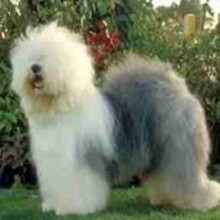Old English Sheepdog
Lifestyle Needs

The Old English Sheepdog is a large herding dog with a long, profuse, weather resistant coat and a loud bark. He is typically intelligent and friendly – not aggressive but protective of his family. Ideally he should live in a large house with a large garden, close to the open countryside. He needs daily exercise with plenty of opportunity to run freely. His coat requires frequent, skilled and dedicated grooming.
Genetic Diversity
(Known as Coefficient of Inbreeding: 'COI'. It should be as low as possible.)
The UK Kennel Club breed average COI is 9.7% - See 'A Beginners Guide to COI'
Gene Pool Size
(Known as Effective Population Size: 'EPS')
51
EPS is a measure of how many individuals are contributing genetically to a breed population. It is a measure of the size of the gene pool in a breed. Lower than 100 is considered critical by conservationists and below 50 brings a breed close to extinction. For more information see the Kennel Club article.
Health and Welfare Problems due to Conformation
(Body shape and physical characteristics)
The Old English Sheepdog’s exceptionally profuse coat will soon cause him welfare problems if it is not given daily care and grooming. Some trimming will be necessary around his face to enable him to see. His coat could also cause problems in warm weather, unless care is taken to keep him cool.
BVA/KC Health Schemes: www.bva.co.uk/chs
- Hip dysplasia: breed 5 year mean score 11.9 (parents should be lower)
- Elbow dysplasia: score should be as low as possible
- Eye disease: Hereditary cataract; Multiocular defects (MOD) (litter screening); Progressive retinal atrophy (PRA) (annual testing)
Estimated Breeding Values (EBVs) : EBVs for Hip Dysplasia are available for this breed
www.thekennelclub.org.uk/about-ebvs
DNA Tests Available
DogWellNet and IPFD Harmonisation of Genetic Testing for Dogs (HGTD)
www.dogwellnet.com/breeds
- Multi drug resistance (MDR 1)
- Primary Ciliary Dyskinesia (PCD)
- Exercise Induced Collapse (EIC)
Availability of a DNA test does not mean that it is always necessary or even desirable for breeders to use this test.
Other Breed-Specific Health Screening Schemes
None known
Ask the breeder to show you the certificates for the above tests/screening for both parents. If any of the above tests have not been considered necessary by the breeder (and there may be good reasons), ask her to explain why.
Other Diseases Reported
(For which there are currently no genetic or screening tests for sire or dam)
- Demidicosis
- Immune mediated haemolytic anaemia
- Osteochondrosis – shoulder
- Entropion
- Distichiasis
- Urolithiasis
- Cancer
Ask the breeder about the medical history of the parents, grandparents and great grandparents. Consider carefully whether to purchase a puppy if some of these or other diseases are in the family line.
Ask about the breeder’s policy in cases of serious genetic diseases occurring to your puppy in later life. Good breeders will request to be informed of such events in order to improve future breeding decisions.
You are strongly advised to buy from a breeder who uses (or is prepared to use) the AWF Puppy Contract and Puppy Information Pack (PIP): www.puppycontract.org.uk
The breeder should also be familiar with the CFSG/DBRG Code of Practice for Dog Breeding